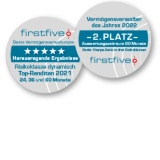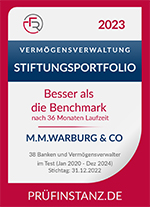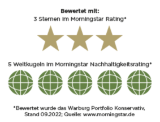We need your consent to display map services
We use Google Maps as third-party software in order to be able to present our locations to you here.
By clicking on "Accept" you agree to the data processing by Google.
We’re convinced: Sustainable investing and returns are not mutually exclusive! By analysing investment securities using ESG criteria, opportunities and risks can be evaluated in greater detail than by classical economic analysis alone. Well-founded research, sophisticated processes and a great deal of experience are required for viable and successful financial investment in the area of ESG. This enables us to assess investments even better – an added advantage that pays off for you!

We use our voting rights to pursue the objectives of sustainability criteria in asset management. The more actors do this, the more the capital market will contribute decisively to greater sustainability in the economy.
Daniel Huber,
Portfolio Manager und ESG specialist

One client had her own unique vision of sustainability, so we developed an individual investment strategy and implemented it in her portfolio. The best investment idea can only add value if it takes all requirements into account.
Britta Grashoff,
Head of Private Banking Bremen
 ???img.spotlight???
???img.spotlight???
 ???img.spotlight???
???img.spotlight???
 ???img.spotlight???
???img.spotlight???
 ???img.spotlight???
???img.spotlight???
 ???img.spotlight???
???img.spotlight???
Sustainable investing doesn’t just focus on environmental protection. Themes such as compliance with human rights standards or the avoidance of bribery and corruption likewise play an important role in the evaluation of companies and states.



At M.M.Warburg & CO, we have developed our own unique sustainability methodology to test and select capital investments in a multi-level process.
We look behind the scenes. With the help of a comprehensive database of our ESG research provider MSCI, we filter out companies that generate revenue from controversial weapons or are involved in seriously controversial business practices, such as child labour. In addition, companies which achieve high turnover through the mining of thermal coal are excluded, since this is accompanied by significant environmental damage.
We analyse at sector level which companies are the most sustainable and exclude companies assessed as below-average in sustainability based on the MSCI ESG Ratings in the sector comparison. In so doing, we avoid the exclusion of entire industries and promote competition for greater sustainability within a sector.
Lastly, the remaining investment universe is assessed qualitatively by M.M.Warburg & CO’s investment experts. Only after taking into account further aspects of ESG and an intensive economic analysis of the investments is release for an investment made.
In the area of impact investments, we invest in companies which make a particular contribution relating to ESG criteria. In addition to green bonds, we acquire funds which, for example, grant microfinance credits in emerging markets.
A substantial risk in sustainable asset investment is so-called ‘greenwashing’, or the making of misleading or unverifiable statements relating to the sustainability of investments. We avoid greenwashing by strict implementation of the sustainability criteria described on this page.
Through active ownership strategies, we engage in long-term and constructive dialogue with portfolio companies, point out potential for improvement and work toward corresponding changes. We supervise the implementation of our recommendations for action.
Trust forms the basis of a long-standing and positive business relationship. We are always there to assist you and your company with our global capital and trading market expertise, as well as with our independent advice, and we are a reliable and safe partner. Let's get started!